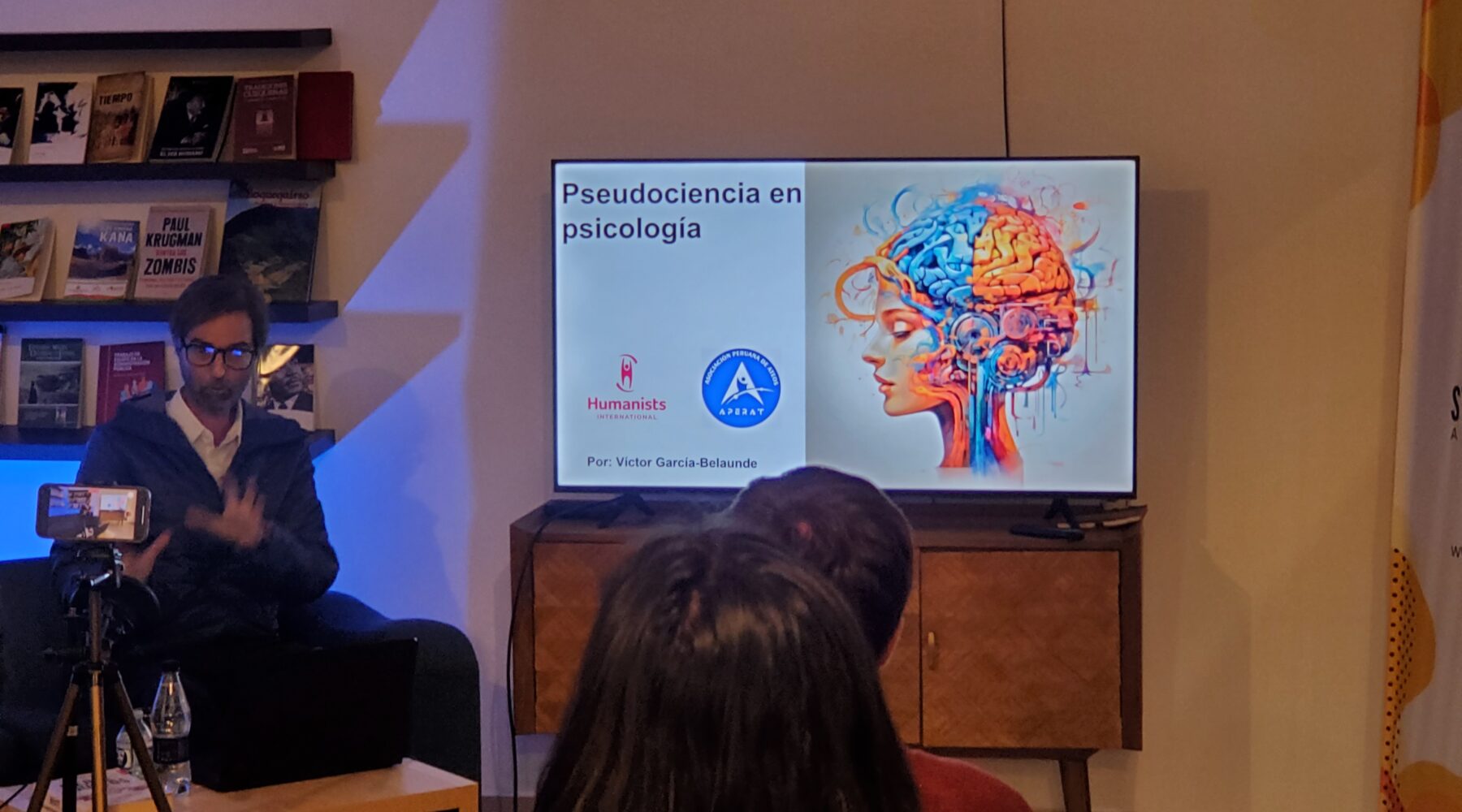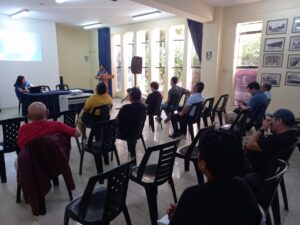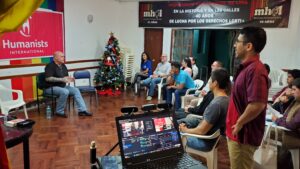


 Piero Gayozzo is the director of the Secular Humanist Society of Peru and a member of the Peruvian Association of Atheists.
Piero Gayozzo is the director of the Secular Humanist Society of Peru and a member of the Peruvian Association of Atheists.
In 2023, the Peruvian Association of Atheists (APERAT) won one of the grants that Humanists International offered to the humanist community around the world. The winning project included two lines of action: i) meeting of members and followers of APERAT and ii) organization of regional networks. We call the latter “The Humanist Route – Peru”. In a previous entry, the reasons why it is important to bring the humanistic approach to the different Peruvian cities were explained, as well as our experience in the first stop of this route in the city of Arequipa was described. Now, we return to our experience and share new advances with you.
After sharing on social networks the results of the event “Atheism, skepticism and society” that took place in the city of Arequipa, there was interest from our community for the event to be replicated in other regions. This time, APERAT called its supporters through social networks and organized a survey to find out what the next destination would be. This is how we managed to contact two free-thinking organizations that share secular values, who followed us and were interested in learning about our humanist approach. These were located in the cities of Chimbote (Áncash) and Cuzco.
Peru is without a doubt a country of Christian tradition. In both Chimbote and Cuzco, the number of religious people overshadows the number of non-believers or people of religions other than Christian denominations. According to the 2018 census, almost 900 thousand people lived in Áncash, of which 625 thousand defined themselves as Catholics, 132 thousand evangelicals, and 39 thousand as not having any religion. About 1 million people live in the department of Cuzco. According to the 2018 population census, of these, almost 750 consider themselves Catholic and about 130 thousand evangelicals. Less than 1% indicated that they do not profess any religion (31,475). Despite this great difference, humanist activism is present and confident that with adequate dissemination we will be able to little by little generate the desired change.
Second Stop: Chimbote
Chimbote is the main port city of the Áncash region, located north of Lima. In previous years, the Peruvian Association of Atheists contacted a group of followers from this city who were interested in being part of the organization and replicating our activities there. Unfortunately, the pandemic put some of our plans on hold. However, thanks to Humanists International this time we were able to resume ties and organize the second stop of the Secular Humanist Route – Peru.
With the support of the group “Chimbote Atheists,” we were able to gather local activists and interested parties around the group of presentations given by our activists Javier Caballero, Coordinator of APERAT, Henry Llanos, president of APERAT, and the main guest historian Sebastián Pastor Ramírez. Topics ranged from organizational aspects, what APERAT does and how it works, to philosophical topics such as “What is secular humanism?” and “Arrival of Atheism in Peru” provided by Javier, Henry, and Sebastián respectively. After the presentations, the event came to an end, but the communication and advice promised for the organization of a new atheist humanist bloc in Chimbote were resumed.

Third Stop: Cusco
The third stop of the Humanist Route in Peru was organized in the City of Cuzco. Capital of the region that bears its name and that once housed the capital of the Inca Empire, Cuzco is located in the southern mountains of Peru and, as an Andean city, has a strong religious tradition. Despite this, its opening to the world as the city of Machu Picchu has encouraged the opening of new ways of thinking. In this city we have the support of Students for Liberty and Open Society, two organizations dedicated to promoting the values of freedom and that also focus on freethought. Thanks to the support of Coordinator Álvaro Aguilar, who has also been part of the Young Humanists and the Secular Humanist Society of Peru, we managed to organize a series of conferences on Saturday, February 3, 2024.
On this occasion, the event was separated into three dialogue tables. The first was related to Secular Humanism and its impact on society. Piero Gayozzo, member of APERAT and co-director of the Humanist Route project – in Peru, gave a conference titled “Crisis of Democracy and its Impact on the Humanist Project.” It explored how authoritarianism, national populism, the authoritarian left, and the alternative right try to undermine the foundations of democratic life. In this context, epistocracy was proposed as a new political paradigm with which to achieve the humanist project. Álvaro Aguilar, psychologist and statistician, also participated, and spoke on “Liberalism and Atheism.” Through this presentation, liberal and enlightened thought was related to atheism, and from a psychological approach it was discussed how some systems of thought could create forms of secular religiosity.

Víctor García-Belaunde Velarde, Founder of the Secular Humanist Society of Peru and member of APERAT, participated in the second table dedicated to skepticism. As a scientific communicator, psychologist, and researcher at the San Ignacio de Loyola University, he has dedicated part of his career to the fight against pseudoscience and the promotion of scientific thought. His lecture was titled “What are pseudo psychologies?” and he offered a definition of pseudoscience and explained what were the main pseudoscientific currents that exist in contemporary psychology.
Finally, the panel on atheism was led by the historian from the Pontifical Catholic University of Peru (PUCP) Sebastián Pastor Ramírez. His conference “The Arrival of Atheism in Peru” offered new data on the configuration of atheistic thought among Peruvian intellectuals at the beginning of the Republic. Thanks to this conference, the efforts of multiple people were known so that today ideas can be discussed without fear of persecution or censorship.
The event in Cuzco culminated with a pleasant meeting with the participants that lasted until late into the night. A detail that caught our attention was that, on the way to the event, we exhibitors came across a spontaneous religious procession that threatened to prevent our arrival; However, the event was achieved with great success. Still, it was a reminder that much work is still needed in our country to achieve a humanistic future.
Activities continue
In Lima, for its part, the activities continued. Thanks to Humanists International we were able to organize different meetings for our activists. We even managed to strengthen ties with José Enrique Escardo, a Peruvian activist known for having denounced the sexual and physical abuse of a religious institution in Peru (Sodalicio de Vida Cristiana), as well as with LGBT communities that were interested in learning more about the humanistic discourse. Perhaps one of the greatest achievements was the meeting of a group of urban activists who were in favor of demonstrating in favor of Peru soon becoming a Secular State. We called this campaign “Black Scarves for a Secular State” and, although it was our first time in the streets, we hope that soon there will be many more of us who gather our voice of protest and achieve that the Catholic Church stops having a presence in the government Peruvian.

Final comments
The Humanist Route – Peru was a very pleasant experience. We were able to connect with new supporters and activists in Peru, strengthen connections that will be used for future projects, as well as exchange experiences on how to continue fighting for a secular country from different fronts. The topics that our exhibitors and speakers offered to the attendees had a great impact on them, since in all the events the questions were abundant and the interest led us to share additional hours with them after the respective events. Unfortunately, the Secular Humanist Route – Peru came to an end, for the moment.
Getting to know new realities and people outside of Lima is not always possible due to the limited resources our organizations have, but this time, Humanists International made it a reality. We thank Humanists International and each of the donors who make it possible for humanist organizations around the world to carry out projects to continue our work for a better world. I sincerely hope that this project serves as an inspiration so that in other parts of the world our humanist colleagues are also encouraged to organize Humanist Routes that include various cities in their countries. The difficult thing is not always daring to speak, but also bridging the gaps that separate us. Together we can achieve the world we want in a shorter time, which is why we are all on the same Humanist Route.